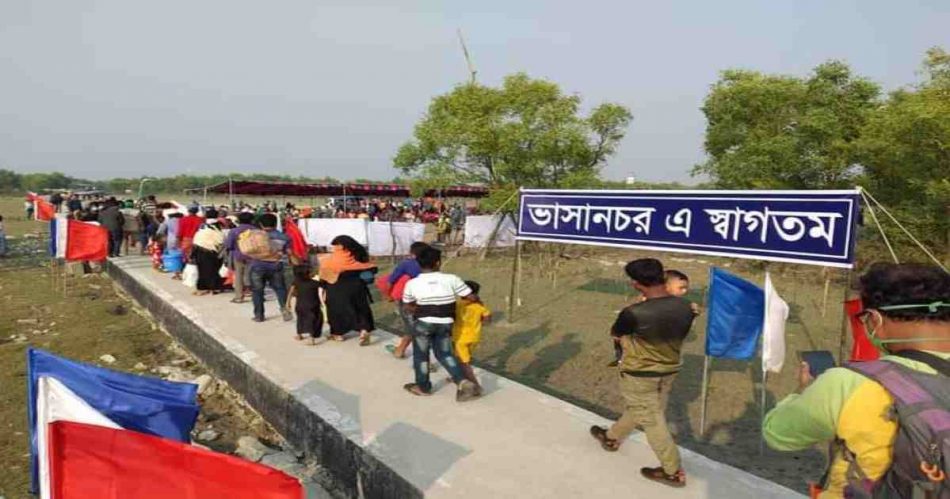Besides the Kashmiris in the Illegally Indian Occupied Jammu and Kashmir (IIOJK) and the Palestinians, the Rohingya Muslims of Myanmar are the most downtrodden people in the twenty-first century. The Muslim community of Rohingya in Myanmar (Burma) is being incessantly targeted and slaughtered mercilessly with nary a voice raised in condemnation. While time and again, human rights activists express concern about the plight of the Palestinians and Kashmiris, little or no remorse comes the way of the Rohingya.
Thousands of these Burmese Muslims have been massacred, while a large number have been forced to flee for their lives and dwell in squalid conditions. Who are the Rohingya and why are they being persecuted by the majority Buddhists, who have been known to be mild natured towards humankind?
The term “Rohingya” implies the Muslims residing in the Arakan State of Burma (Myanmar) who migrated to the region following the arrival of Arab traders in the 8th Century. In a recent headcount, 800,000 Rohingya barely subsisted in Myanmar and have been described by the UN as “one of the world’s most persecuted minorities”. Ironically, neither the UN nor the OIC have taken up the cudgel seriously on behalf of the downtrodden Rohingya.
The root of the problem is that the repressible Burmese regime does not recognize the Rohingya Muslims as citizens or grant them the status of an indigenous ethnic group with full citizenship rights. The Burmese junta considers them as illegal immigrants from Bangladesh, while the Burmese law enforcement agencies are not ready to protect them from rioters, who loot and plunder at will.
The persecution of the Rohingya continues unabated since General Ne Win usurped power in 1962 in a coup d’état and stripped the Muslims of their Burmese citizenship and cracked down on them mercilessly. Thousands were forced to flee to the neighboring territories of Bangladesh, Indonesia and Thailand, but they were turned back callously or forced to suffer more persecution. Thousands of escaping Rohingya perished in the derelict boats and rafts they tried to reach safety in but inclement weather, pirates and callous Thai, Indonesian and Bangladeshi authorities who tried to turn them away, added to their misery.
According to another UN report, an even more shocking picture of the abuse and violence faced by the beleaguered Rohingya minority in Myanmar emerged. Based on witness testimony, the report documents an ugly series of crimes this Muslim minority group was subjected to during a ‘clearance operation’ carried out by the Myanmar military. Amongst the horrific crimes perpetrated are gang rape and murder, including of children in which, the report says, members of the army and police as well as civilians took part. By all standards of human rights, this community has faced unconscionable and consistent abuse from large sections of the majority; there is simply no justification for this horrendous violence.
Ironically, Nobel Laureate human rights champion Aung San Suu Kyi, who should have defended the oppressed Rohingya, not only remained criminally silent at the tyranny but when the International Court of Justice (ICJ) called the Myanmar junta to task for their gross abuse of human rights, she defended the military. Fatefully, with the recent military coup in Myanmar, Aung San Suu Kyi herself is suffering incarceration at the hands of the military junta she had chosen to get acquitted at the international judicial body. History will judge her but the credibility of Ms SuuKyi will remain under a cloud for letting down the persecuted Rohingya, and, in fact, being complicit in the crimes committed against them.
For the Rohingya Muslims, those who had ultimately found refuge in Bangladesh, are in for another bout of wretchedness. According to Iranian Press TV, thousands of Rohingya Muslims from Myanmar who had taken refuge in Bangladesh are now planned to be relocated from crowded camps to a flood-prone island in the Bay of Bengal despite concerns about the risk of storms and floods lashing the site.
Two Bangladeshi officials informed media outlets that 3,000 to 4,000 more Rohingya refugees would be moved to remote Bhasan Char Island over the next few days. Dhaka has relocated around 7,000 to Bhasan Char Island since early December from overcrowded refugee camps in Cox’s Bazar in southeastern Bangladesh. On reaching Bhasan Char, the Rohingya will not be allowed to leave the island, which is several hours’ journey from the southern port of Chittagong.
Bangladesh has drawn criticism for a reluctance to consult with the United Nations refugee agency and other aid bodies over the transfers. According to the UN High Commissioner for Refugees, the agency has not been allowed to evaluate the safety and sustainability of life on the island.
Bangladesh claims that the relocation is voluntary, but some of the first group to be moved spoke of being coerced. Some Rohingya reportedly agreed to relocate to the island after they were shown video footage of the shelters.
The Bangladesh government has dismissed safety concerns over the island, citing the buildings are safe against floods. Bangladesh has been planning since last year to relocate the Rohingya to the desolate and flood-prone site.
Some human rights groups have voiced concern about the plan because the island is remote and prone to devastation from cyclones. They have warned the island might not be able to withstand violent storms during the annual monsoon season. In the past five decades, powerful cyclones have killed thousands of people in the Meghna River estuary, where the island is located.
One can only pray that the Rohingya misery comes to an end soon; the world conscience remains oblivious to their cries of anguish.
*The writer is a retired Group Captain of the Pakistan Air Force. He is a columnist, analyst and TV talk show host, who has authored six books on current affairs, including three on China.
February 22, 2021
The viewpoints expressed by the authors do not necessarily reflect the opinions, viewpoints and editorial policies of Aequitas Review.


